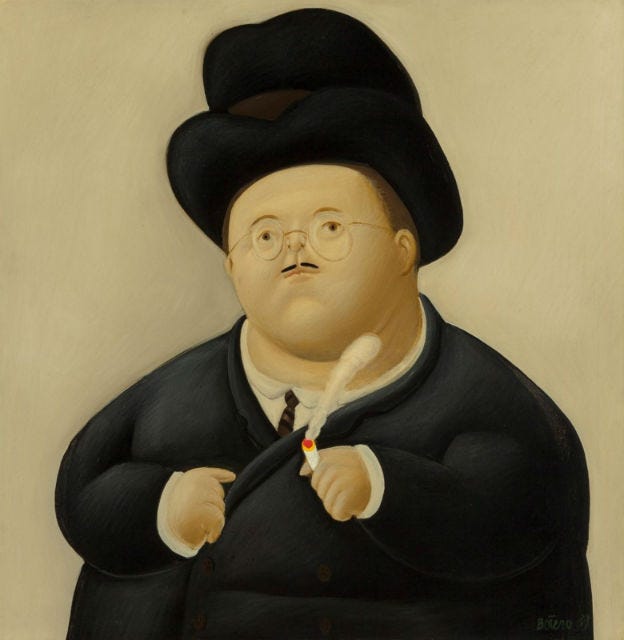Dear Reader,
I recently had the pleasure of interviewing one of my favorite writers on Substack, soon to be off of Substack as well (due to an upcoming book release!). Shifra has posted 8 short stories and over 30 articles on since January of 2021, each one more fascinating than the last.
Initially, I was captivated by the quirky, eccentric characters dominating Shifra’s oddly compelling narratives of elderly adventure. Then I began reading her articles on behavioral psychology, moral philosophy, and artistic discovery, which I found to be deeply thought-provoking and further pulled me into her world of thought. I can’t recommend Shifra and Absurdus enough!
Hope you enjoy this interview as much as I did. ~ WM
When did you discover that you enjoyed storytelling? Was there a catalyst that stoked your interest?
I’ve always found that answering this question is akin to remembering your very first word. Your memory won’t guide you that far back in the timeline, only some older person claiming to know can tell you. So, my grandmother would probably have said I discovered storytelling right when I could hold up a pencil. She had a knack for exaggerating, but it sounds good. And anyway, I really don’t recall a time wherein I wasn’t at least imagining stories in my head. That’s also why I can’t say there was one big catalyst that changed the entire trajectory of my life. Writing has just always kind of been there for me. I was a very quiet child, it was the only way I could express myself. The old cliché: books were my only friends for a very long time.
I saw on your Instagram that you're also a talented artist and sculptor. What would you say is your favorite medium for creative expression and why?
Thank you! I do also sculpt and paint. I’d say between art and writing, the former requires abstraction, while the latter requires constant analysis. Both are very important, yet highly dependent on my setting/place in life, etc. One feels more like allowing myself to scream and cry, while the other is reminiscent of sitting on a therapist’s couch and talking through my feelings. One is uncontrolled, the other controlled. At this point in my life, I would say writing is my preferred medium for self-expression, but that could change tomorrow.
Your fiction features characters in the later stages of life. What draws you to this specific type of character portrayal?
Throughout my life I’ve been especially close to my grandmother, who always gave off the distinct smell of a withering flower, even when, or especially when, both she and I were much younger. Mortality becomes a prevalent theme as we near our demise. Through which lens do they look back and analyze life? What can they change in their present moment to make sure they are remembered in the right light?
Also, elderly people tend to have their own way of doing things, always slightly different to the conventions of today. They are also excused for having strange quirks, so in a way I rely on them heavily, especially when my stories take on a slightly controversial tone. Who are we to judge a dementing 90 year old man?!
What was the motivating factor in choosing Substack over other platforms to host your work?
I became obsessed with Elle Griffin’s writing on
, and how highly she spoke of the platform. I made an account in the midst of quarantine, so I had a lot of time on my hands. It was my first real attempt at sharing my work and I’ve gotten to know a whole community of writers since. I can’t recommend Substack more, and I have been telling just about everyone who likes to write.You have an upcoming novel called "Imaginary Order". What will it be about and how can we get a copy?
I do! In short, it is a coming-of-age story told through the eyes of a young girl, Nani, as her mother struggles to regain her life after a near fatal-accident. Their journey together, first to Switzerland, then Italy through to Amsterdam morphs into a redeeming tale of self-discovery, independence, and the inevitable severing of the eternal child who hides within us all. It is, I should add, a fictional story. You can get a copy over on Amazon, Waterstones or Barnes & Noble!
I'm still learning how to maintain a consistent writing schedule. Do you have any advice for writers battling burn-out?
Writing has always been an integral part of my daily life, and anything that morphs into a habit becomes slightly easier to do. For better or worse. My habits shifted somewhat when I started Imaginary Order. There’s a certain structure you have to follow when writing a book. It’s much more complex, in my opinion, than short story writing. You have to remember everything, you can’t allow your fingers to take over, your brain needs to be constantly on. It starts feeling more like a job. During those moments, your writing schedule becomes your best friend. I can only write in the mornings, the earlier the better, and never before a big cup of coffee. But find when works best for you. Set a daily word count goal, especially if you are struggling with burn-out. Create a list of short term objectives. Be kind to yourself, but not overly lenient.
If you had to pick one of your characters to hang out with for a day, which one would it be and why?
I love this question! It would definitely have to be one of my short story characters. I would go with Meredith in Home for Senile Women. She’s sassy, quick-witted, full of life despite her 91 years. She’s based on my grandmother, so what’s not to love.
I read that you would enjoy working as a full-time writer. How have you approached your monetization strategy in order to make that a reality?
To be honest, I have absolutely no idea. For the time being I am still a student, which makes for a great excuse. But I have some highly-intelligent, successful professors at Columbia, who come baring excellent advice. Before any of them made it work, they had jobs on the side. One worked at a publishing house for years and wrote throughout the early morning hours. One works as a ghost writer half the year, then spends the other half on his novel. Until I finish my degree, I plan on writing in the mornings, while dedicating my afternoon to my schoolwork, and continuing with my freelancing work throughout the weekends. My posture would make the Hunchback of Notre Dame envious, and my eyesight is deteriorating rapidly.
Has writing affected how you see the world? Please explain.
In much the same way as a book can change how you see the world, writing alters your perception of reality. It forces you past the superficial surfaces, deeper within the things themselves. Creating a living, breathing, three-dimensional character out of nothing more than the attributes that make up your imagination, forces you to look deeper into the human psyche. A character cannot feel real if they do not possess all the quirks and flaws that differentiate a human from a zombie. I think writing molded me into a more empathetic person in that regard. On the other side, because writing requires a certain degree of depth, and a lot of time alone, I feel like, with time, I have become a more anxious person. Anything analyzed to its very core becomes a scary thing. Where did everything come from? How did we get here? Even the, or especially the, beautiful things in life bring forth my existential dread. How did this flower come to be? And which forces make it whither just as quickly? I need to find a way to balance thinking and feeling.
Thank you, Shifra! If you’re interested in Shifra’s upcoming book, Imaginary Order, consider using the following links to pre-order your copy today, or purchase on December 16th!
That’s the end of our interview with Shifra Steinberg. We hope you enjoyed it. Please like and share this with friends and family. Join us in the comments for any questions or interests you may have. Thanks for reading. ~ WM












Thank you so much for taking the time! I’m so happy that our paths crossed, I’ve been following along on your journey for just as long. I can’t wait to see where this substack journey takes you!